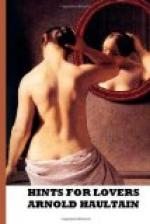* * *
Wholly to satisfy masculine infatuation is given to no woman. And perhaps
Wholly to satisfy feminine caprice is given to no man. So, sometimes,
The last refuge of an unrequited love is the belief that love will create love. Nothing can be more futile than such a faith. Yet
Love without hope, has its mitigations; but
How alleviate the pain of a love that mistook a simulated love for a true one?
A simulated love is a contradiction in terms.
Either one loves or one does not, that is the conclusion of the whole matter.
* * *
Love would rather suffer than forget.
Love would give the world to be able to exculpate a languid lover.
A passionate love is perhaps always poignant.
Love disdains pity.
A wounded love carries a scar to the grave.
* * *
In love, when honor is lost, loss of shame soon follows. Then indeed the downward patch becomes precipitous.
* * *
To some, love never comes; to some, it comes too often; but the same love never recurs, as never a bud opens twice: happy he or she is who gains bud, blossom, and fruit. Since
The sweetest love is that wherein the odorous flower of passion ripens into the nourishing fruitage of affection. But
Love requires careful nature. And
The more exotic the love, the more difficult its culture.—True, An orchid may life on air. Yes; but how torrid and vaporous an air!
Your sturdy mistletoe thrives on the humble apple; a Cattleya requires a Columbian forest.
* * *
Youth wonders at the amatory successes of middle-age. Youth knows not that
In matters amatory, age is no handicap:
A girl in her ’teens will make love to a gentleman of forty—and vice versa. In fact
The indiscreet impetuosity of youth succumbs before the astuteness of age.
The bachelor and the spinster both sometimes wonder that the benedick and the bride are still their rivals; for they know not that
In the amatorial art, matrimony is no handicap. In short,
There is no barrier at which love will balk. Nay more,
Love will forgive anything:
Did love demand it, love, though it might blush, would not blench. And
Often love itself stands amazed at its own divine audacity. Indeed,
Love loves to immolate itself for love. Knowing that
To love, nothing is common or unclean: for
Love, like charity, thinketh no evil. But—remember that
It is only the Uranian Aphrodite (5) that dares essay
a divine audacity.
Nevertheless,
Love is the most vulnerable of the emotions, and
A love doubtful of itself would be cautiously accepted: it is not a fact that
To try to feel one’s own pulse, is to make the
heart beat irregularly?
So,




